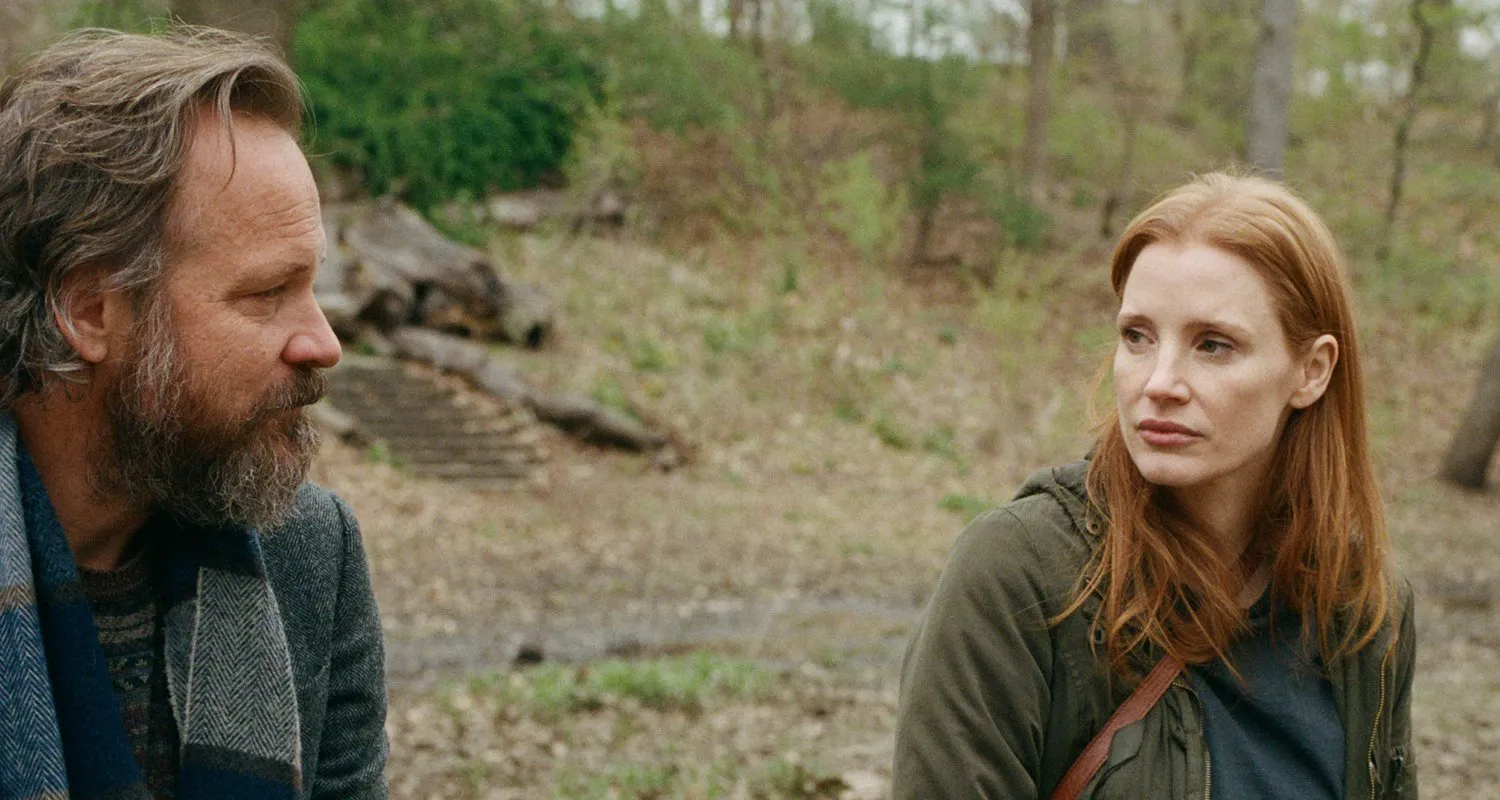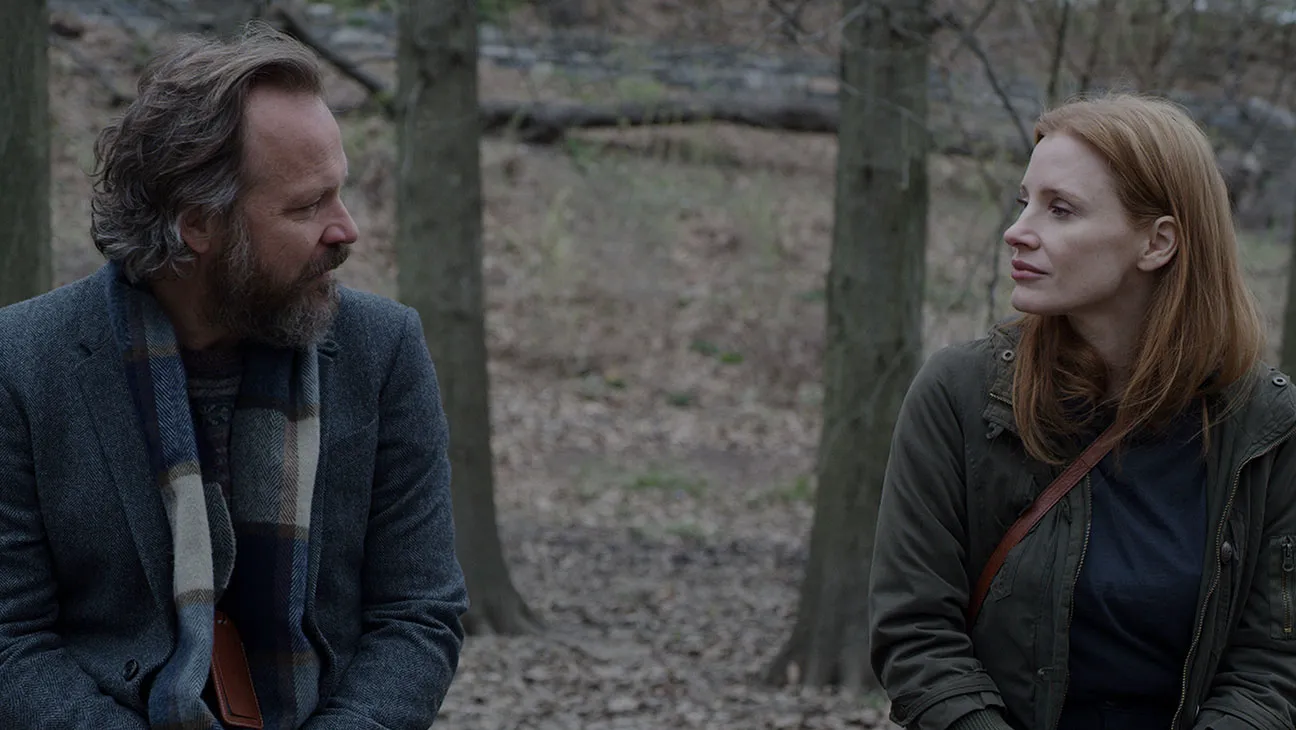Sarah (Jessica Chastain) attends Alcoholics Anonymous meetings, works at a social services center, and raises her teenage daughter Anna (Brooke Timber) alone. Sarah’s husband passed away several years ago. One day, the single mother attends her high school reunion and finds it incredibly dull. A strange, bearded man follows Sarah home. The stranger spends the entire night outside, and in the morning, it turns out his name is Saul (Peter Sarsgaard). Saul has dementia. Sarah starts visiting Saul during the day for a fee, and the pair gradually grows closer.

Jessica Chastain as Sylvia in “Memory”
“Memory” is directed by Michel Franco, a Mexican filmmaker who, unlike his compatriots Alejandro González Iñárritu, Alfonso Cuarón, and Guillermo del Toro, isn’t rushing to Hollywood but continues to make festival dramas. The film premiered in the main competition at last year’s Venice Film Festival, where Peter Sarsgaard won the Volpi Cup for Best Actor. Franco is an uneven and unpredictable director. He often makes quiet family dramas, but his filmography also includes the expressive dystopian “New Order” and the wild odyssey of a wealthy man tired of his old life, “Sundown.” The director is still searching for his artistic voice.
A Return to Intimate Storytelling
With “Memory,” Franco returns to his signature genre: unhurried stories about traumatized people. Sarah was subjected to domestic violence by her father as a child. Even worse, her mother (Jessica Harper) didn’t believe her, and her younger sister Olivia (Merritt Wever) didn’t want to get involved. This is where Sarah’s problems with alcohol and fear of intimacy stem from. At home, the door is always locked with three locks, and she doesn’t allow her daughter Anna to go on dates or parties with friends. Saul was happily married, but his wife died, and then illness struck. Now, suffering from dementia, he lives with his brother Isaac (Josh Charles), rarely goes outside, and feels like a burden.

Peter Sarsgaard as Saul in “Memory”
Avoiding Manipulation
It’s easy to accuse Franco of being manipulative. “Memory” is a story about the emergence of feelings between a recovering single mother and a widower with dementia. It sounds like a surefire entry for a prestigious European festival. Plus, the main roles are played by Hollywood stars. However, the director doesn’t dwell on the traumas of the central characters, doesn’t introduce additional dramatic twists into the plot, and doesn’t try to force tears from the audience. Life is hard enough as it is, but Saul and Sarah are used to difficulties. The director often uses close-ups, gently looking at the couple, but at the same time afraid to disturb the harmony of the budding relationship. Franco chooses an intimate and sincere tone, which is endearing.

Jessica Chastain as Sylvia in “Memory”
Finding Solace in Each Other
Sarah only remembers the domestic violence when she meets her hated mother, and Saul tries not to talk about his illness at all. Now, the widower doesn’t remember recent events and therefore can’t follow the plot of a movie. But the couple sits sweetly by the TV; Saul simply hasn’t felt as comfortable with anyone as he does with Sarah in a long time.
Franco shows in detail what life is like for a person with dementia. Memory fails, you can end up on the street at any moment, and it can be difficult to remember the name of an acquaintance. However, the widower doesn’t give up but treats the illness with a smile, with self-deprecation. It seems to be the only worthy medicine against an incurable disease. Sarah desperately needs a kind person like Saul in her life, someone she can trust and not fear for her safety. The quirky couple complements each other perfectly.
A Modern Social Fairytale
The touching “Memory” can be called a modern social fairytale, even though the colors are mostly gray, and most of the events take place in New York apartments. Almost from the first minutes, you can predict that Saul and Sarah will be together, but it’s more important for the author to show their strength of spirit, their desire to continue fighting and seeking happiness. And it’s simply nice to see smiles on the faces of the suffering heroes.
Middle-aged loners are drawn to each other because they understand each other’s problems perfectly. Saul and Sarah don’t even need extra words. No condemnation, anger, resentment, or attacks, only acceptance. Isn’t the meeting of two almost broken people a real miracle? Don’t Sarah and Saul deserve happiness? I want to believe that such love stories are possible not only on the movie screen.